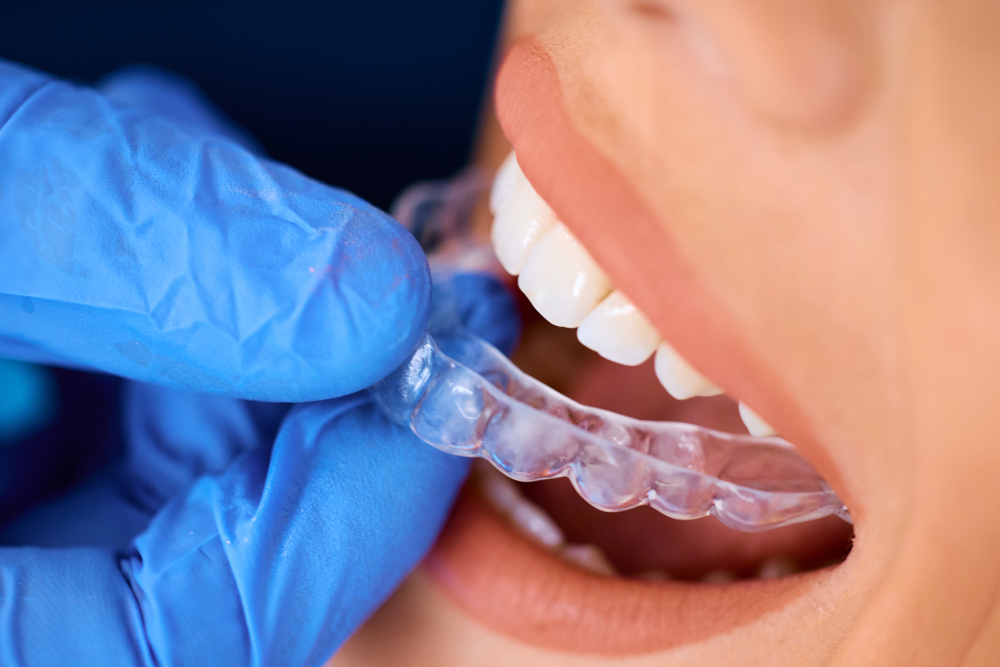
Most of us know mouthguards are great for protecting teeth during sports—but they’re useful in many other situations too.
From nighttime grinding to TMJ discomfort, the right mouthguard can protect your smile, reduce pain, and prevent long-term dental damage.
If you’ve ever wondered which type you might need, here’s a clear breakdown.
Mouthguards Best for:
Quick, inexpensive protection
Common uses: Youth or recreational sports
What they are: Stock mouthguards are pre-formed and ready to wear right out of the package. They’re the most affordable option and easy to find at drugstores or sporting goods shops.
Pros: Cheapest option Easy to buy and replace
Cons: Bulky and may feel uncomfortable Hard to speak or breathe while wearing Because they don’t fit well, they offer the least protection
Ideal for: Temporary or occasional sports use—but not recommended for long-term protection.
Mouthguards Best for:
Better fit on a budget
Common uses: Organized or competitive sports These are also sold in stores, but they’re molded to your teeth at home. After softening in hot water, you bite into the material so it forms around your teeth.
Pros: Better fit than stock guards Inexpensive and customizable Decent protection
Cons: Fit depends on how well you mold it Material wears down faster Not ideal for heavy grinding or medical conditions
Ideal for: Most sports players who want affordable, reliable protection.
Best for: Maximum comfort, protection, and long-term use
Common uses: Contact sports, teeth grinding (bruxism), TMJ disorders, protecting dental work Made by a dentist using a digital scan or impression of your teeth, custom guards fit like a glove and are made from durable, high-quality materials.
Pros: Best comfort and breathability Very secure fit Long-lasting protection Can be made for specific dental needs (braces, implants, grinding)
Cons: Higher cost Requires a dental visit
Ideal for: Anyone who wants the safest and most comfortable option—especially athletes or people who grind their teeth at night.
Best for: Preventing worn-down teeth, jaw pain, and headaches
Used by: People with bruxism, TMJ symptoms, cracked teeth, or morning soreness Unlike sports guards, night guards are designed to absorb grinding forces and protect the enamel.
Benefits: Reduces wear on teeth Helps with jaw tension and headaches Prevents chipping or cracking dental work Custom night guards work best, especially for heavy grinders. Store-bought versions may feel bulky and often don’t last long.
Mouthguards Best for:
Anyone playing sports with braces These guards are shaped to fit over brackets and wires without damage. They prevent cuts to lips and cheeks during impact and help protect expensive orthodontic work.
Taking Care of Your Mouthguard
No matter what type you choose:
Rinse before and after use Store in a ventilated container Keep it out of hot water or high heat
Bring it to dental checkups to check wear and fit ????
A mouthguard is a small investment that can save you from expensive dental emergencies and chronic pain. If you’re unsure which kind is best for you—especially if you grind your teeth or play high-impact sports—ask your dentist for guidance. The right guard can make all the difference.
Contact Dr Michael Handler Dentistry for more details.
Do you ever feel nervous about dentist appointments? Rest assured: we cater to nervous and anxious patients in a gentle and considerate manner. Call us now to schedule a free consultation!